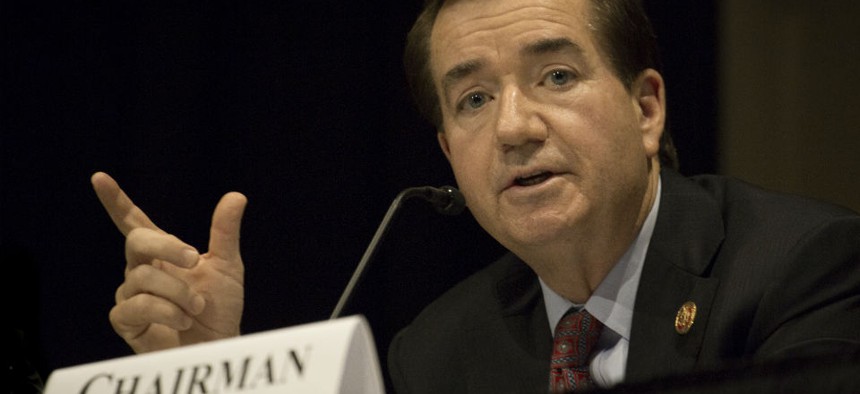
Rep. Ed Royce, R-Calif., introduced the bill in April. Flickr user csufnewsphotos
House Passes Ambitious Reorganization of U.S. International Broadcasting
Foreign Affairs Chairman Royce calls part-time BBG 'broken and ineffective.'
The long-disputed Broadcasting Board of Governors would be thoroughly reorganized under a reform bill the House passed Monday evening by voice vote.
The 2014 United States International Communications Act (H.R. 4490) would clarify the agency’s mission in an age of digital competition and establish a full-time, day-to-day agency head while reducing the role of the part-time board to an advisory capacity.
“For many years, our international broadcasting has been broken and ineffective,” said House Foreign Affairs Committee Chairman Ed Royce, R-Calif. “While strongmen, despots, and terrorists are working overtime on their public disinformation campaigns, the U.S. Broadcasting Board of Governors, which oversees our international broadcast efforts, meets once a month. The status quo is a recipe for failure on the critical information front.”
The agency -- which includes the Voice of America, Radio Free Europe/Radio Liberty, Radio Free Asia, the Middle East Broadcasting Network, and divisions serving Africa and the Caribbean --must be restructured into an “effective tool in the fight against censorship and harmful misinformation,” Royce added.
Under the bill, BBG would be renamed the U.S. International Communications Agency. Its six branded broadcast entities would for the first time share administrative staff to achieve collaborative economies of scale, and be given the same mission: “to provide uncensored local news and information to people in closed societies,” Royce said.
Most important, the bill “clarifies the mission of the Voice of America” by making it clear that VOA’s job is to “support U.S. public diplomacy efforts,” he added in a summary of the bill. Over the years, the bill’s backers say, VOA has drifted into use of “surrogates” to provide uncensored commercial-style news in closed societies rather than presenting U.S. policies.
After introducing the bill in April with ranking member Rep. Eliot Engel, D-N.Y., Royce sent a Dear Colleague letter to House members noting that then-Secretary of State Hillary Clinton had told his committee that the nine-member “Broadcasting Board of Governors is practically defunct in terms of its capacity to be able to tell a message around the world,” a “dysfunction,” Royce continued, also documented in inspector general reports.
The BBG has declined to comment on the pending bill, though in January it reorganized its executives’ responsibilities as a step toward any move Congress might make to centralize its management.
Prospects in the Senate are unclear, according to staff, because no companion bill was introduced before the House acted.
Steady support for the reforms has come from the American Federation of Government Employees, Local 1812—though not without some internal dissent. Local President Tim Shamble in a series of statements praised the bill as a “rare bipartisan and bicameral effort….It is our belief that those who have diligently worked on this reform bill have a sincere desire to fix an agency that is indisputably in disrepair,” he said.
On the local’s website and in an interview with Government Executive, Shamble criticized a news report quoting newsroom employees -- some in the union, some not -- protesting that the bill would turn them into public relations officers rather than journalists. “No one is interested in turning the VOA into a propaganda machine,” Shamble said, adding that AFGE was working to tweak the provision dealing with a charge to actively support U.S. policy. “In supporting this legislation, the union was battling not only for jobs but also for the preservation of the mission of VOA. An important part of that mission has always been and should remain: the broadcast of accurate, objective and comprehensive news.”
BBG Watch, the anonymous blog that harshly criticizes the BBG, has been sympathetic toward the bill. Its coverage of the vote showcased former VOA executives expressing hostility. “If this bill becomes law, VOA's worldwide following would plummet,” tweeted former VOA Deputy Director Alan Heil. VOA’s own coverage of the bill’s passage, BBG Watch wrote, “includes quotes by two outside opponents of the bill…but has no quotes from any outside supporters of the bill, including human rights NGOs, U.S. community leaders, and former Voice of America journalists who wrote a letter to President Obama in support of the legislation. So much for balance in Voice of America news reporting as required by the VOA Charter.”
(Image via Flickr user csufnewsphotos)
NEXT STORY: House Republicans Unveil Their Border Bill







